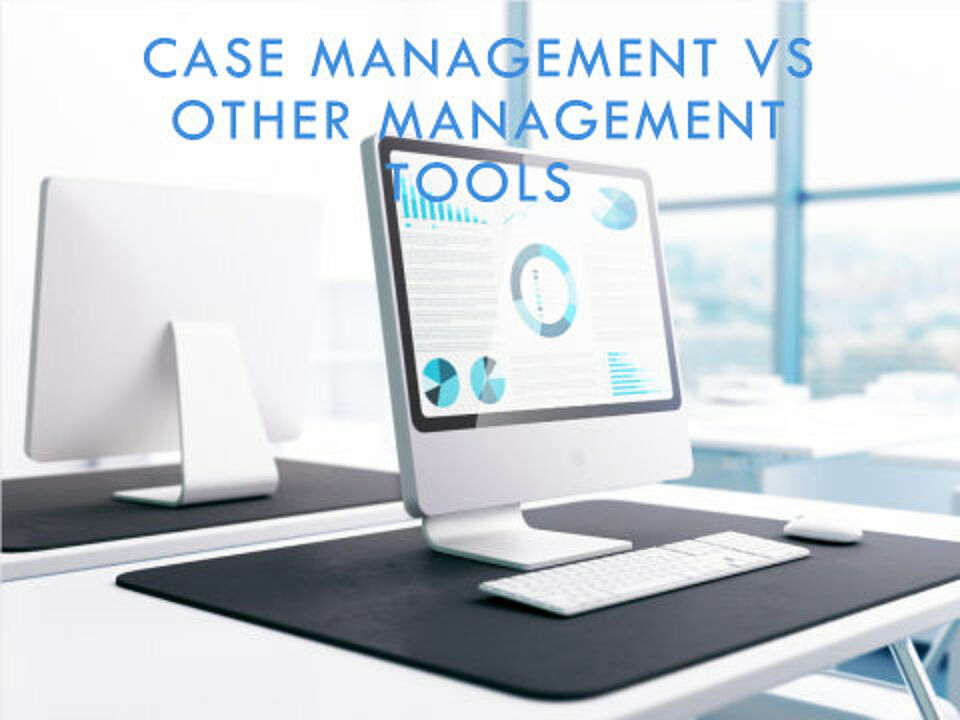
In today's rapidly evolving business world, efficiency is the key to success. Companies are constantly looking for ways to optimise their processes, increase productivity and ultimately improve their performance. This is where case management software plays a crucial role - a technological innovation that has the potential to fundamentally change the way enquiries and corporate cases are managed.
Author: Jochen Möller (Managing Director and CoFounder of EcholoN)
Creation: 04.04.2024, last change: 04.04.2024
Table of contents
Case management software: definition and main functions
Differences between case management software and other management tools
Implementation strategies for case management software
Forward-looking developments in case processing software
How does EcholoN support case management?
In today's rapidly evolving business world, efficiency is the key to success. Companies are constantly looking for ways to optimise their processes, increase productivity and ultimately improve their performance. This is where case management software plays an important role as part of enterprise service management. A technological innovation that has the potential to fundamentally change the management of enquiries and company cases.
Case management software: definition and main functions
Case management software, also known as case management software, is a sophisticated tool designed to simplify the process of recording, monitoring and processing cases (enquiries) within an organisation. These software systems provide a centralised platform for storing, accessing and analysing all case information. The main functions include
- Data capture: Central enquiry portal. A user-friendly interface for capturing and storing case information.
- Task management: Functions for assigning and tracking tasks associated with cases.
- Communication tools: Built-in options for communication between all parties involved in the process.
- Reporting and analytics: Advanced options for generating reports and analysing case trends.

Differences between case management software and other management tools
Unlike general project management tools that are widely used, case management software is specifically designed to meet the needs of organisations that handle complex case-based workflows. While project management software is ideal for time-limited projects with a defined start and end, case management software provides the necessary flexibility and depth of functionality for managing and analysing cases on an ongoing basis.
Areas of application for case management software in various sectors
The software is used in numerous sectors, including:
- Healthcare: For managing patient data, treatment plans and communication with medical staff.
- Legal: For organising client information, documents and deadlines in law firms.
- Social work: To coordinate services and resources for individuals and communities.
- Business sector: For processing customer enquiries, support cases and internal processes.
Benefits of implementing case management software
Introducing this software into an organisation can bring various benefits, from improved internal processes to stronger customer relationships. Here are some key benefits:
- Increased efficiency in case processing: by centralising case information, employees can access required data more quickly. Automated processes reduce the time spent on routine tasks, resulting in shorter processing times and increased overall efficiency.
- Improved data management and accessibility: A standardised system makes it easier to access information anywhere and at any time, which is particularly beneficial for companies with multiple locations or home offices.
- Automation of processes: Repetitive and time-consuming tasks are simplified through automation, allowing employees to focus on more challenging and value-adding activities.
- Strengthening relationships with customers and clients: Fast and efficient case processing improves customer satisfaction and strengthens customer loyalty through quick response times and a clear flow of communication.
Choosing the right case management software
Choosing the right software is crucial to the success of its introduction. Companies should consider the following aspects:
- Essential functions: The software should provide all the necessary functions for smooth, cross-departmental collaboration in order to fulfil specific case management requirements.
- Scalability and adaptability: The solution should be able to grow with the company and adapt to changing needs.
- Integration into existing systems: For a smooth transition and efficient use, the software should be able to integrate with the existing IT infrastructure.
- Security and data protection: Choose software that offers strong security features and ensures compliance with relevant data protection regulations.

Implementation strategies for case management software
Implementing a new software solution can be challenging, but with the right approach, a smooth transition is possible. The following steps provide a framework for successful implementation:
- Planning and preparation: thorough planning and involvement of all stakeholders is critical.
- Employee training: Comprehensive training and support ensure the successful use of the new tools.
- Data migration and integration: The transfer of existing data and integration with other systems is often technically challenging, but can be simplified through careful planning.
- Continuous evaluation and customisation: After implementation, it is important to monitor usage and collect user feedback in order to optimally adapt the software to the company's needs.
Challenges and solutions during implementation
The implementation can encounter various challenges, from employee resistance to security concerns. Open communication, thorough preparation and the selection of secure software solutions are key to success.
There are a wealth of benefits to implementing case management software, from more efficient workflows to improved service quality and customer satisfaction. With the right preparation, strategy and selection, organisations can overcome these challenges and take full advantage of these powerful tools.
Investing in the right software is a crucial step in optimising current working practices and preparing for a flexible, data-driven future. In a time of rapid technological change and rising customer expectations, it is essential for organisations to remain agile and continuously evaluate and update the tools they use.
The introduction of first-class case management software is therefore not the end, but the beginning of a journey towards greater effectiveness, efficiency and engagement - both internally and in customer and client interaction. Digital transformation through advanced software solutions opens up unrivalled opportunities to drive change and ensure long-term success.

Trendsetting developments in case management software
The landscape of technology, especially in the field of case processing software, is constantly changing. For organisations that want to compete and realise the full potential of their systems, it is essential to stay on top of the latest technological developments. The following outlines forward-looking trends that could bring about significant changes in the way organisations use case management software:
Artificial Intelligence (AI) and Machine Learning: these advanced technologies hold the promise of fundamentally transforming case management. By further automating processes and offering personalised user experiences, AI and machine learning can reduce processing times and significantly increase accuracy in case handling. From predicting case outcomes to automating the allocation of resources based on case type, AI and machine learning have the potential to vastly increase efficiency and effectiveness.
Mobility through apps: In our increasingly mobile society, access to case management software via smartphone or tablet is becoming more and more important. Mobile applications enable employees to access critical information regardless of their location, optimise communication and minimise response times.
Cloud computing: The migration of case management systems to the cloud brings many benefits, including scalability, cost savings and increased data security. Cloud-based solutions offer companies the flexibility to react quickly to market developments and simplify system maintenance.
Data protection and security: In times of growing concerns about data protection and increasingly stringent regulations, security and data protection are becoming critical decision factors when selecting case management software. Solutions that offer comprehensive security features and compliance guarantees are particularly in demand.
These trends point to an exciting future for case management software, in which technological innovations not only increase efficiency and productivity, but also help to improve the quality of customer service and the security of data. Companies that proactively integrate these developments are strategically positioning themselves to reap the benefits of digital transformation.
How does EcholoN support case management?
EcholoN is a comprehensive service management solution that supports case management through a number of key features and benefits. Here are some of the ways in which EcholoN effectively supports case management:
Centralised data storage: EcholoN enables all relevant case information to be stored centrally, making it easier to access and analyse data. This provides efficient information management and ensures that all team members are up to date.
Automation of processes: The software automates recurring tasks within case management, such as ticket assignment and status updates. This automation optimises workflows and allows employees to focus on more demanding tasks.
Flexibility and adaptability: EcholoN is characterised by a high degree of adaptability, which allows companies to adapt the software to their individual requirements. This scalability ensures that the solution can grow with the growing needs of the company.
Improving communication with customers: Through integrated communication tools, EcholoN improves interaction with customers. The support of different communication channels contributes to consistent and effective communication, which strengthens the customer relationship.
Advanced analysis and reporting capabilities: EcholoN provides extensive analytical tools that allow managers to monitor and improve the efficiency of their case management processes. Detailed reports can be used to identify areas for improvement and take appropriate action.
Data security and compliance: With the increasing importance of data privacy and security, EcholoN offers strong security measures to protect sensitive data. The software ensures compliance with relevant data protection regulations, allowing organisations to manage their data with confidence.
In summary, EcholoN provides effective support for case management by simplifying case management, streamlining processes and improving communication, while ensuring data security and compliance. By using EcholoN, organisations can increase their service quality, leading to increased customer satisfaction and loyalty.
Frequently asked questions about case management software
The implementation of case management software often triggers a variety of questions. To clear up any confusion and provide additional information, here are some of the most frequently asked questions about this innovative technology.
What are the costs of case management software?
The cost of case management software varies greatly depending on the provider, the range of features required and the number of user licences. Many providers offer customised pricing models that are tailored to the specific needs and size of the company. It is advisable to obtain direct quotes from different providers in order to assess the costs in relation to the expected benefits. EcholoN Case Management as an on-premise solution costs 5000 EUR for 5 users.
How long does the implementation take?
The length of time it takes to implement case management software depends on several factors, including the complexity of the software, the amount of data migration required and the commitment of the implementation team. Smaller projects can potentially be completed within a few weeks, while larger implementations can take several months. EcholoN can be installed out-of-the-box and go live within a day, including a small training session.
Is it possible to integrate case management software with other systems?
Yes, most modern case management systems offer integration options with a variety of other business applications. This can include CRM systems, accounting software, email services and other specialised applications. The ability to integrate is a key factor in the seamless use of the software within existing workflows.
How secure is case management software?
The security of case management software is a primary concern for vendors. Many solutions offer advanced security features, including data encryption, two-factor authentication and regular security audits. When selecting software, it's important to choose a vendor that meets the compliance requirements of your industry and provides transparent information about its security practices.
Final conclusion and summary
Case management software marks a turning point towards a new era of efficiency and productivity for organisations across all industries. From improving internal processes to increasing customer satisfaction and ensuring data security, the benefits are numerous and significant. By considering the implementation strategies discussed, future trends and answers to common questions, companies can set the course for successful digitalisation of their case management processes.
Choosing the right case management software is not only a step towards improving current ways of working, but also a commitment to a more agile, data-driven future. In the face of rapid technological developments and rising customer expectations, it is essential for organisations to remain flexible and continuously evaluate and adapt the tools they use.
The introduction of high-quality case management software is therefore not the end, but the beginning of a journey towards greater effectiveness, efficiency and engagement - both internally and in interactions with customers and clients. Digital transformation through the implementation of advanced software solutions offers unrivalled opportunities to drive change and ensure long-term success.
Perhaps also interesting:
